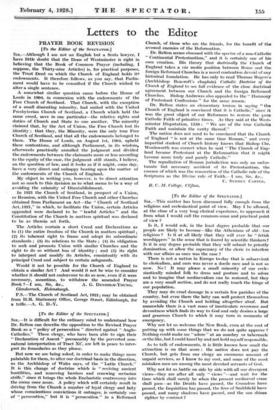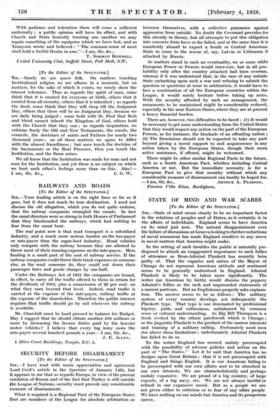[To the Editor of the SPECTATOR.] Snr,—This matter has been
discussed fully enough from the religious and ecclesiastical point of view. May I be allowed, at the close of a very long clerical experience, to approach it from what I would call the common-sense and practical point of view ?
Is it, I would ask, in the least degree probable that our people are likely to become—like the Athenians of old—too religious ? Is it at all likely that they will ever be " fetish worshippers" in the sense that is feared by scientific thinkers? Is it in any degree probable that they will submit to priestly domination, or allow the supremacy of the cleric to interfere with our affairs as once was the case ?
There is not a nation in Europe to-day that is subservient to clericalism, and ours was never a docile race and is not so now. No ! It may please a small minority of our eccle- siastically minded folk to dress and posture and to adore and to imagine that mediaevalism can be restored, but they are a very small section, and do not really touch the fringe of our population.
They may do cruel damage in a certain few parishes of the country, but even there the laity can well protect themselves by avoiding the Church and holding altogether aloof. But meanwhile there is a vast mass of inarticulate reverence and devoutness which finds its way to God and only desires a large and generous Church to which it may turn in moments of emergency.
Why not let us welcome the New Book, even at the cost of putting up with some things that we do not quite approve Nothing could make me "adore" at an aumbry or tabernacle or the like, but I could kneel by and not hold myself responsible.
As to talk of endowments, it is little known how small the attraction is on that score : the nation does not pay the Church, but gets from our clergy an enormous amount of unpaid services, as I know to my cost, and some of the most mistaken men are among the most devoted servants of God.
Why not let us battle on side by side with all our divergent views—they are after all only " views "—and wait for the time which shall surely be when the present mediaeval craze shall pass—as the Druids have passed, the Crusaders have: passed, the Inquisition has passed, the fires of Smithfield have passed, and many shadows have passed, and the sun shines righter by contrast ?
With patience and toleration there will come a sufficient uniformity ; a public opinion will have its effect, and with Church and State honestly trusting one another we may regain something of the equipoise which we have lost, and as Tennyson wrote and believed : " The common sense of most shall hold a fretful Realm in awe."—I am, Sir, &c., • T. NorodAN ROWSELL.
United University Club, Suffolk Street, Pall Mall, S.W.







































 Previous page
Previous page